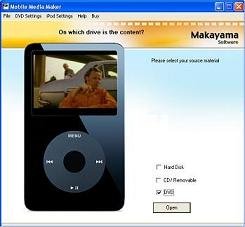Makayama: DVD-to-iPod Ripper...DRM in Review

That's what Makayama is giving to the world. It's a company that sounds like a Japanese motorcycle manufacturer, and even has a little Japanese flag on one of its web pages. But, to my surprise, it's actually located right here in Amsterdam, in the old post office building, which also holds a (night) club and (temporarily) the museum of modern art. That's right here:

The iPod Media Studio. This innovative software lets you watch home movies, feature films and TV-series on your video iPod in great quality, in full screen, zoomed mode. [...] The software installs an encoding package on a Windows XP computer, users pick any video file from their harddrive, CD or DVD and with only three clicks, the software turns it into a compressed movie file, which will play on the MPEG4-mediaplayer on the iPod.The press release presses the point that "A 60 Gb iPod may store up to 200 hours of home movies and tv recordings or one hundred full length feature films." That sounds like a soon-to-be classic little DVD ripper. Might their be a reason that Apple didn't dive into this? The answer is probably in the company profile:
Makayama supports fair use and is reviewing several DRM standards to incorporate in its products.Fair use is certainly a feature that everybody wants, but Apple doesn't give us. Or can't give us, since it can't put a product on the market that rips content protected DVDs, while still reviewing "several DRM standards to incorporate". Maybe I'm reading to much in this little sentence. Or, maybe it's the small (circumvention) disclaimer with one of their other products, DVD to Pocket PC, that gives some doubt about the legality of the software, at least under the US Digital Millennium Copyright Act circumvention provisions:
This software was not designed or produced to circumvent technology that effectively protects access to, or restricts the duplication of, copyrighted material. It has a commercially significant purpose other than to circumvent and has major non-infringing uses; being primarily designed to transcode home movies, tv-programming, personal video and audio files, and feature films from a users harddrive and/or on removable media. It does not produce digitally identical copies, but transcodes into a lossy, strongly compressed file. Its sole purpose is to enable a platform- and timeshift allowing playback of lawfully aquired content, under the fair use principle.That's fair use, alright. Some might doubt that an old post office building near the harbour of Amsterdam will also provide a safe harbour for fair use circumvention under the ever stronger enforcement of the European Copyright Directive.
Oh, I wasn't able to see if iPod Media Studio actually ripped away any DRM: it runs on Windows only, no Mac supported.




